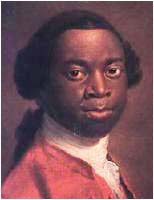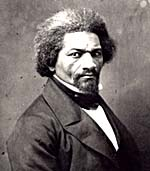
LITR 4332 American Minority Literature: Lecture Notes
begin selections from Slave Narratives
|
|
|
Objective
1
To define the
“minority
concept" as a power relationship modeled by some ethnic groups’
historical relation to the dominant American culture.
1a.
“Involuntary (or forced)
participation”
(Unlike the dominant immigrant culture, ethnic minorities
did
not choose to come to America or join its dominant culture. Thus the
original "social contract" of Native Americans and African Americans
contrasts with that of European Americans, Asian Americans, or most Latin
Americans, and the consequences of "choice" or "no choice"
echo down the generations.)
Crevecoeur 9.5
Douglass 7.8
Bread Givers as immigrant / dominant culture narrative (> American Dream)
Immigrant voluntarily leaves homeland
> journey
> America as land of opportunity
> assimilates by giving up old language for new, intermarrying, accepting New World as "my world"
Equiano as minority narrative (>Dream)
Minority is violently forced to leave homeland
> journey
> America not opportunity but slavery
> Assimilation partial; intermarriage legally denied and culturally resisted; instead, a dependent and limited parallel world
Objective
3
To
compare and contrast the
dominant “American Dream” narrative—which involves voluntary
participation, forgetting the past, and privileging the individual—with
alternative
narratives of American minorities, which involve involuntary participation,
connecting to the past, and traditional (extended) or alternative families.
Tabular
summary
of contrasts between the dominant culture's "American Dream" narrative
and minority narratives
(still Objective
3)
(
dominant-culture
Minority
Narratives
Cultural
group's original relation to USA
Voluntary
participation (individual or ancestor chose to come to America)
Involuntary
participation ("America" came to individual or ancestral
culture)
Cultural
group's relation to time
Modern
or revolutionary: Forget the past, leave it behind, get over it
(original act of immigration; future-oriented)
Traditional
but disrupted: Reconnect to past (not voluntarily abandoned;
more like a wound calling for healing)
Social
structures
Abandonment
of past context favors individual or nuclear family,
erodes extended
social structures.
Traditional
extended family shattered;
non-nuclear, "alternative," or improvised families survive.
![]() CATEGORY
CATEGORY![]()
of
dominant-minority comparison)
(not traditional immigrants)
3a.
African American alternative narrative:
“The Dream”
"The Dream" resembles but is not identical to "The American
Dream," which emphasizes immediate individual success.
"The Dream" factors in setbacks, the need to rise again, and a quest
for group dignity.
3b.
Native American Indian alternative
narrative:
"Loss and Survival"
Where immigrants define themselves by leaving the past behind
come to America, the Indians already had America but lost it along with many of
their people. Yet they defy the myth of "the vanishing Indian," instead choosing
to "survive," often assuming the dominant culture
will eventually destroy itself, and the forests and buffalo will return.
3c.
Mexican
American narrative: “The Ambivalent Minority” / "Americano Dream"
"Ambivalent" means having "mixed feelings" or
contradictory attitudes. Mexican Americans may exemplify immigrant culture as
individuals or families who suffer social dislocation by coming voluntarily to America for economic gain, but
Mexico's historic experience with the USA resembles Native America's: most of the
Southwestern United States (including Texas) was once Mexico. Does a Mexican who moves from Juarez to El
Paso truly immigrate?
chiasmus
4.2-4.5 chiasmus
metaphor
FD 5.9 white face, kindly emotions
FD 6.1 by trade a weaver [class]
FD 7.6-7 anti-slavery + Catholic emancipation
HJ 6.20 w/ jealous mistress
FD [10D.8] I felt as I never felt before. It was
a glorious resurrection, from the tomb of slavery, to the heaven of freedom.
My long-crushed spirit rose, cowardice departed, bold defiance took its
place; and I now resolved that, however long I might remain a slave in form,
the day had passed forever when I could be a slave in fact.
FD 1.11
blood-stained gate, the entrance to the hell of slavery
1.3 father
white man,
whispered
1.3 part mothers from children, blunt and destroy natural
affection
1.4 see me in the night
1.5 profitable as well as pleasurable
1.7 very different-looking class of people
1.11
blood-stained gate, the entrance to the hell of slavery
2.4 night as slave’s time
2.7, 2.11 double language
3.1-2 garden excludes slaves
3.5 never utter a word
3.7 penalty of telling the truth
4.2-4.5 chiasmus
5.3 evolutionary / capitalist metaphor
5.9 white face, kindly emotions
6.1 by trade a weaver [class]
6.5 literacy, white man’s power to enslave black man
6.6 chiasmus
6.7 city over town, anti-romance
7.2 slavery as injurious to her
7.3 slavery and education incompatible
7.5 bread of knowledge
7.6-7 anti-slavery + Catholic emancipation
7.8 slavers as
robbers, gone to
7.11 Irishmen
7.13 copy-book as board fence
8.2 all ranked together
8.9 brandy and slavery
8.11 knowledge to run away
9.2 Methodist
camp meeting, 2nd
Great Awakening
9.4 learn to read New Testament, broke up
9.7 Covey a professor of religion
10A.1 Covey as “the snake” + 2 power to deceive
10B.2 cf. Emerson
10C.1 chiasmus
10D.
10D.7 turning point in career as slave
10D.8 glorious resurrection from tomb of slavery
10E slaves’ holidays
10E.3 vicious dissipation
10F.2 no pretensions to religion; religion of the south
10G.1
10G.3 society of my fellow-slaves
10G.7 Patrick Henry, liberty or death
10H.5 cf. law enforcement
10H.6 yellow mulatto devil
10H.10 slave traders as pirates
10H.13 stone
prison to
10i.3 class / race conflict
10i.7 Mrs. Auld
10J.3 money to master
11.3 underground railroad
11.5 continued to think
11.7 camp meeting
11.8 civil disobedience
11.13 leave escape unexplained
11.18 marriage ceremony
11.22 change my name
11.23 absence of slaves > wealth
11.28 starting point of new existence
A.2 slaveholding religion
FYI: Harriet Jacobs's autobiography, but written like a novel, with different names--the "Harriet" character is called "Linda," for instance.
What about the sexual component of slavery? What does Jacobs say about being not just a slave, but a woman slave?
How do we discuss mixed-race births, and what impact do they have on racial identity?
Douglass:
Chapter 1
My mother was named Harriet Bailey. She was the daughter of Isaac and Betsey Bailey, both colored, and quite dark. My mother was of a darker complexion than either my grandmother or grandfather.
My father was a white man. He was admitted to be such by all I ever heard speak of my parentage. The opinion was also whispered that my master was my father . . . .
It was the blood-stained gate, the entrance to the hell of slavery, through which I was about to pass. It was a most terrible spectacle. I wish I could commit to paper the feelings with which I beheld it.
This occurrence took place very soon after I went to live with my old master, and under the following circumstances. Aunt Hester went out one night,-where or for what I do not know,--and happened to be absent when my master desired her presence. He had ordered her not to go out evenings, and warned her that she must never let him catch her in company with a young man, who was paying attention to her belonging to Colonel Lloyd. The young man's name was Ned Roberts, generally called Lloyd's Ned. Why master was so careful of her, may be safely left to conjecture. She was a woman of noble form, and of graceful proportions, having very few equals, and fewer superiors, in personal appearance, among the colored or white women of our neighborhood.
Aunt Hester had not only disobeyed his orders in going out, but had been found in company with Lloyd's Ned; which circumstance, I found, from what he said while whipping her, was the chief offence. Had he been a man of pure morals himself, he might have been thought interested in protecting the innocence of my aunt; but those who knew him will not suspect him of any such virtue. Before he commenced whipping Aunt Hester, he took her into the kitchen, and stripped her from neck to waist, leaving her neck, shoulders, and back, entirely naked. He then told her to cross her hands, calling her at the same time a d----d b---h. After crossing her hands, he tied them with a strong rope, and led her to a stool under a large hook in the joist, put in for the purpose. He made her get upon the stool, and tied her hands to the hook. She now stood fair for his infernal purpose. Her arms were stretched up at their full length, so that she stood upon the ends of her toes. He then said to her, "Now, you d----d b---h, I'll learn you how to disobey my orders!" and after rolling up his sleeves, he commenced to lay on the heavy cowskin, and soon the warm, red blood (amid heart-rending shrieks from her, and horrid oaths from him) came dripping to the floor. I was so terrified and horror-stricken at the sight, that I hid myself in a closet, and dared not venture out till long after the bloody transaction was over. I expected it would be my turn next. It was all new to me. I had never seen any thing like it before. I had always lived with my grandmother on the outskirts of the plantation, where she was put to raise the children of the younger women. I had therefore been, until now, out of the way of the bloody scenes that often occurred on the plantation.
Chapter V
Mr. and Mrs. Auld were both at home, and met me at the door with their little son Thomas, to take care of whom I had been given. And here I saw what I had never seen before; it was a white face beaming with the most kindly emotions; it was the face of my new mistress, Sophia Auld. I wish I could describe the rapture that flashed through my soul as I beheld it. It was a new and strange sight to me, brightening up my pathway with the light of happiness. Little Thomas was told, there was his Freddy,--and I was told to take care of little Thomas; and thus I entered upon the duties of my new home with the most cheering prospect ahead.
Questions:
How do Americans traditionally relate to mixed-race identities, children, etc?
How much has the traditional separation changed recently, and why?
Can you relate the imbalance of sexual power to the imbalance of race power?
2a. Gender: Is the status of women, lesbians, and homosexuals analogous to that of ethnic minorities in terms of voice and choice? Do "women of color" become "double minorities?"
compare-contrast immigrant & minority narrative: Equiano
Compare passage from
Bread Givers
188 ran away from home, make my own way in world
189 paid a dollar, felt the riches
189 my voice was like dynamite
189 rest of the story flowed on like magic
189 in business for himself
With Equiano
57-8 (32-3) slave ship
including “melting pot”
62 pent up together like so many sheep (37)
63 we were sold after the usual manner (37) [contrast selling]
64 no person I could speak to that I could understand (39)
iron muzzle (x-voice)
66 he meant me for a present (40)
80 speak English tolerably well, relish society and manners, men superior to us (51)

